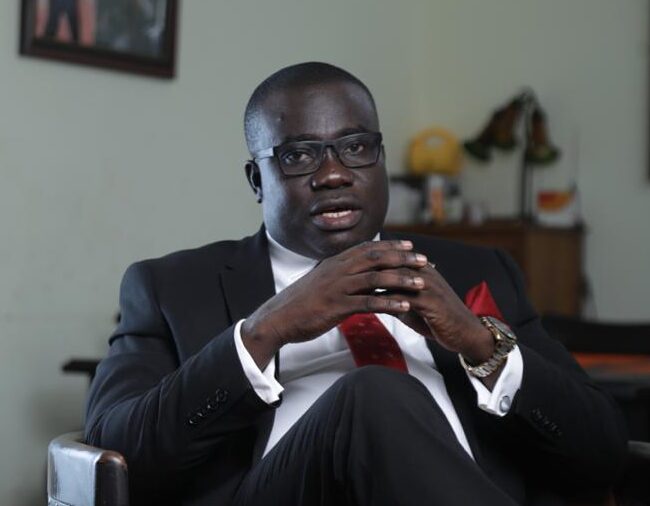Cancel All Prospecting Licenses to protect Ghana’s Environment – Paul Twum

The Honorable Member of Parliament (MP) for Dormaa East, Paul Twum Barimah, has described the decision by the Minister of Lands and Natural Resources, Samuel Abu Jinapor to suspend all prospecting licenses granted mining companies as spot on.
Speaking in an exclusive interview with ghananewsonline.com.gh, the astute Communication and Energy specialist said the Lands minister has even been lenient with the mining companies by suspending their prospecting licenses. In his view, the minister should have cancelled their licenses, arrest and prosecute them for touching our forests and the environment without the appropriate license or legal backing.
- Advertisement -
Paul Twum Barimah indicated that illegal, unregulated and irresponsible mining is seriously threatening the existence of Ghana’s forest reserves, rivers and water bodies. He described the situation as life threatening and that drastic measures must be taken to curb it.
- Advertisement -
He said with the negative impact of climate change hitting hard on the environment Ghana will feel the real impact of disaster if steps are not taken to protect and save the environment
According to Paul Twum Barimah ‘Ghana has lost over GH₵36 billion to environmental degradation, based on figures from the Institute of Environment and Sanitation Studies at the University of Ghana. Country Environmental Analysis by the World Bank which revealed that environmental degradation costs the nation $6.3billion or nearly 11 percent of the country’s 2017 Gross Domestic Product. He noted that much is done to save the situation and the money is channeled into other sectors of the economy like infrastructural development and energy, Ghana wouldn’t be experiencing infrastructural deficits and energy problems
The legislator for Dormaa East has therefore recommended some measures to be undertaken by the government to curb the situation. These include cessation of the issuance of new mining licenses for a year, reclassification of mining categories to reflect the use of new/larger equipment, the allowance of water bodies to regenerate their natural ecology, tree planting and a land reclamation project.
The Lands Minister last week directed individuals and companies engaged in prospecting in forest reserves with or without legal authorization, to suspend such activities until further notice. The Minister’s decision followed revelation that a number of individuals and companies unlawfully acquired licenses under the pretext of undertaking reconnaissance or prospecting in Forest Reserves and yet proceeded to engage in illegal mining in such Forest Reserves, with its obvious adverse consequences on the environment.
He further directed the Minerals Commission with immediate effect, not to accept process or recommend the grant, including renewal or extension of reconnaissance and prospecting licenses in Forest Reserves.
- Advertisement -
Climate change in Ghana is projected to affect its vital water resources, energy supplies, crop production and food security. Ghana is already experiencing increased extreme weather conditions with higher incidences and more prolonged periods of flooding and droughts. High temperatures will further increase, and rainfall patterns will be less predictable. More intense rainfall is expected to increase erosion, while less total rainfall may decrease the water flow. The country’s vulnerability is largely due to dependence on the production of crops that are sensitive to climate change, including cassava and cocoa, and by a lack of agricultural diversification.
The United Nations Sustainable Development Goal 13 calls for climate action to reduce the negative impact of Climate Change. The UN notes that Greenhouse gas emissions are more than 50 percent higher than in 1990. It states that Global warming is causing long-lasting changes to our climate system, which threatens irreversible consequences if we do not act.
It further states that the annual average economic losses from climate-related disasters are in the hundreds of billions of dollars. This is not to mention the human impact of geo-physical disasters, which are 91 percent climate-related, and which between 1998 and 2017 killed 1.3 million people, and left 4.4 billion injured. The goal aims to mobilize US$100 billion annually by 2020 to address the needs of developing countries to both adapt to climate change and invest in low-carbon development.
The UN believes that supporting vulnerable regions will directly contribute not only to Goal 13 but also to the other SDGs. These actions must also go hand in hand with efforts to integrate disaster risk measures, sustainable natural resource management, and human security into national development strategies. It is still possible, with strong political will, increased investment, and using existing technology, to limit the increase in global mean temperature to two degrees Celsius above pre-industrial levels, aiming at 1.5°C, but this requires urgent and ambitious collective action.
The Sustainable Development Goals (SDGs), also known as the Global Goals, were adopted by all United Nations Member States in 2015 as a universal call to action to end poverty, protect the planet and ensure that all people enjoy peace and prosperity by 2030.
The 17 SDGs are integrated—that is, they recognize that action in one area will affect outcomes in others, and that development must balance social, economic and environmental sustainability.
By Adu Koranteng
- Advertisement -



